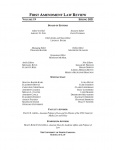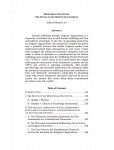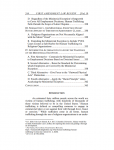ISNOINews
Independent Scientology and Nation of Islam news
Law Review Article -- Ministerial Exception: The Involuntary Servitude Loophole, by Juliana Moraes Liu* (2020). (The article discusses Headley v. Church of Scientology International.)
*J.D. 2020, Yale Law School; B.A. 2017, Columbia University. Juliana would like to thank Ambassador Luis C. deBaca for inspiring this article and guiding it through its development.
First Amendment Law Review
Vol.19
Spring 2020
At 314 - 344.
Full article available for free at:
Volume 19/
https://falrunc.files.wordpress.com/2021/05/liu-final.pdf
* * * * * BEGIN ABSTRACT * * * * *
Human trafficking through religious organizations is a frequently overlooked issue in both human trafficking and First Amendment scholarship. In the face of expanding protections for religious organizations, the ministerial exception has grown into a powerful doctrine that shields religious entities from employment-related legal consequences in civil courts. Courts must recognize the ministerial exception’s expanded reach and refuse to allow its operation as a jurisdictional bar for human trafficking cases arising under the Trafficking Victims Protection Act (“TVPA”). Lower courts in the United States have begun addressing the intersection of the ministerial exception and the TVPA and arrived at opposing conclusions. This Article provides legal and normative justifications for refusing to apply the ministerial exception to trafficking claims and contributes to First and Thirteenth Amendment scholarship by furnishing courts with several interpretive alternatives that can be used to resolve the tension that arises when these constitutional provisions come into conflict.
* * * * * END ABSTRACT * * * * *
* * BEGIN TABLE OF CONTENTS * *
Table of Contents
INTRODUCTION 314
I. THE ROOTS OF THE MINISTERIAL EXCEPTION 318
A. Shukla v. Sharma 319
B. Headley v. Church of Scientology International 320
II. DOCTRINALLY, IMPOSITION OF FIRST AMENDMENT INVIOLABILITY IS AHISTORICAL AND INAPPROPRIATE IN AN ANTI-SLAVERY SETTING 322
A. The Thirteenth Amendment Supersedes the First Amendment in a Constitutional Framework 323
B. The Thirteenth Amendment Deliberately did not Carve out Religious Protections 324
C. The Free Exercise and Establishment Clauses do not Provide Immunity for Religious Organizations 326
D. Regardless of the Ministerial Exception’s Outgrowth to Cover All Employment Decisions, Human Trafficking Falls Outside the Scope of Labor Disputes 328
III. NORMATIVELY, THE MINISTERIAL EXCEPTION OUGHT NOT BE APPLIED TO THIRTEENTH AMENDMENT CLAIMS 330
A. Religious Organizations are Not Necessarily Aligned with the Moral “Good” 330
B. Extending the Ministerial Exception to Include TVPA Cases Creates a Safe Harbor for Human Trafficking via Religious Organizations 333
IV. INTERPRETIVE ALTERNATIVES TO AVOID THE TRAPPINGS OF THE MINISTERIAL EXCEPTION 335
A. First Alternative – Constrain the Ministerial Exception to Employment Decisions Based on Doctrinal Issues 335
B. Second Alternative – Raise the Standard for Determining which Employees are Covered by the Ministerial Exception 338
C. Third Alternative – Give Force to the “Outward Physical Acts” Distinction 340
D. Fourth Alternative – Apply the “Harm Principle” when Analyzing the Ministerial Exception 342
CONCLUSION 343
* * END TABLE OF CONTENTS * *
* * * * * BEGIN EXCERPT * * * * *
B. Headley v. Church of Scientology International
In contrast, the district court in Headley affirmatively applied the ministerial exception to a TVPA claim and allowed the Church of Scientology to eliminate the court’s subject matter jurisdiction through the ministerial exception. Referencing the Shukla decision, Judge Fischer refused to follow the New York court, holding that the ministerial exception does not apply to the TVPA. The Headley opinion dismissed the Shukla decision stating that “[t]he only support for this argument comes from an out-of-circuit magistrate judge’s report and recommendation that does not even cite to Ninth Circuit decisions on the ministerial exception, let alone apply the exception in accordance with Ninth Circuit case law.”
Plaintiffs Marc and Claire Headley joined the Church of Scientology’s secretive “Sea Org” as teenagers. They labored for over 100 hours per week but received only $50 in weekly stipends in addition to their Church-provided living expenses.33 They were also assigned additional manual labor as a form of discipline. 34 Further, they alleged that they were unable to leave. Claire and Marc Headley filed suit against the Church of Scientology under the TVPA.
_________________________
29. Headley v. Church of Scientology Int’l, No. CV 09-3987 DSF (MANx), 2010 WL 3184389, at *6 (C.D. Cal. Aug. 5, 2010).
30. Id.
31. Id.
32. Headley v. Church of Scientology Int’l, 687 F.3d 1173, 1174 (9th Cir. 2012).
33 Id. at 1176.
34 Id.
_________________________
Unlike Magistrate Judge Pollak on the Second Circuit, Judge Fischer approached the TVPA and trafficking as an extension of labor relations. The Headley court readily accepted the Church of Scientology’s argument that the challenged conduct was “doctrinally motivated,” and therefore refused to investigate the merits of the Headleys’ claims. The court explained that “inquiry into these allegations would entangle the Court in the religious doctrine of Scientology and the doctrinallymotivated practices of the Sea Org.” Judge Fisher applied the labor-based precedent of the ministerial exception to the trafficking claim, explaining that it would be impossible to disentangle the Headleys’ allegations from the Church of Scientology’s religious doctrine. Throughout the Ninth Circuit opinion as well, much deference was given to the Church of Scientology’s claims of doctrine. Although the Ninth Circuit did not reach the ministerial exemption question, both the trial court and the Ninth Circuit exhibited a reluctance to distinguish human trafficking from existing ministerial exception jurisprudence.
The district court opinion improperly allows room for human trafficking to be legitimately contained within religious doctrine deserving of judicial protection. Judge Fisher wrote “[d]etermining whether Scientology’s practices of routing out, censorship, or heavy manual labor as a form of discipline, for example, constitute involuntary servitude within the meaning of the TVPA is precisely the type of entanglement that the Religion Clauses prohibit.” This extreme deference to religious doctrine dangerously allows the legitimization of religious practices that
_________________________
35. Id. at 1177.
36. Id. at 1178
37. Headley v. Church of Scientology Int'l, No. CV 09-3987 DSF MAN, 2010 WL 3184389, at *4-6 (C.D. Cal. Aug. 5, 2010).
38. Id. at *6.
39. Id.
40. For example, Claire Headley alleged that one of the methods of control exerted over her by the Church of Scientology was its forcing her to obtain two abortions. Id. at *5. Judge Fischer explained that “inquiry concerning the pressure Plaintiff allegedly faced after becoming pregnant would require review of Scientology’s doctrine prohibiting Sea Org members from raising children.” Id. at *6.
41. The Ninth Circuit began its analysis by setting forth Scientology’s expectations for its members, effectively laying out First Amendment exemptions for the organization. Headley, 687 F.3d at 1174 (“The Sea Org demands much of its members, renders strict discipline, imposes stringent ethical and lifestyle constraints, and goes to great efforts to retain clergy and to preserve the integrity of the ministry. These features of the Sea Org flow from the teachings and goals of the Scientology religion.”).
42. See id. at 1181. See also Headley, 2010 WL 3184389, at *6.
_________________________
would otherwise be prohibited by the Thirteenth Amendment.
The Ninth Circuit’s refusal to reach the ministerial exemption question prevents the Headleys and others similarly situated from using the legal system to remediate alleged human trafficking. In fact, this district court approach would, if it were binding precedent, legitimize human trafficking by religious organizations and give them carte blanche to ignore the Thirteenth Amendment. The Headley district court decision to apply the ministerial exception to TVPA cases allows First Amendment protections to entirely overwhelm and cast aside any Thirteenth Amendment concerns, effectively permitting religious organizations to engage in serious human rights abuses without any judicial scrutiny.
_________________________
43. Headley, 2010 WL 3184389, at *6.
44. See, e.g., Jennifer M. Chacón, Misery and Myopia: Understanding the Failures of U.S. Efforts to Stop Human Trafficking, 74 FORDHAM L. REV. 2977, 2998 (2006) (arguing that the TVPA was enacted to “revitalize” the protections of the Thirteenth Amendment against involuntary servitude).
* * * * * END EXCERPT * * * * *
* * * * * BEGIN CONCLUSION * * * * *
CONCLUSION
The ministerial exception exists to protect religious organizations from the type of government interference that would prevent the fulfillment of religious missions. It does not exist to exempt religious organizations from all laws and regulations, and it certainly does not exist to give religious organizations a free pass to traffic their employees. The Trafficking Victims Protection Act is a vital piece of legislation that provides survivors of human trafficking with civil remedies against the infringement of their constitutional Thirteenth Amendment rights. The First Amendment’s Free Exercise and Establishment clauses must not be interpreted to vanquish Thirteenth Amendment protections. Such an approach would be counter to public policy and to the original intent and mission of the Thirteenth Amendment, which deliberately did not carve out an exemption for religious organizations.
Permitting the use of the ministerial exception as a defense to TVPA cases is improper from both legal and normative perspectives. Human trafficking in religious organizations is an unfortunately common occurrence, and religious traffickers must not be excused solely by virtue of their religious status. Courts handling TVPA cases should not permit the use of the ministerial exception as a jurisdictional bar given the unique legal status that human trafficking has in American law. The Thirteenth Amendment must not be reduced to simply another manifestation of labor laws that fall subservient to broad religious freedoms in the United States and must instead be upheld as constitutionally vital and crucial to the fight against human trafficking.
* * * * * END CONCLUSION * * * * *
EDITED TO ADD:
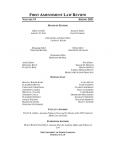
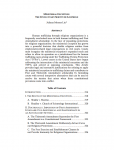
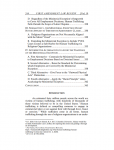
/
*J.D. 2020, Yale Law School; B.A. 2017, Columbia University. Juliana would like to thank Ambassador Luis C. deBaca for inspiring this article and guiding it through its development.
First Amendment Law Review
Vol.19
Spring 2020
At 314 - 344.
Full article available for free at:
Volume 19/
https://falrunc.files.wordpress.com/2021/05/liu-final.pdf
* * * * * BEGIN ABSTRACT * * * * *
Human trafficking through religious organizations is a frequently overlooked issue in both human trafficking and First Amendment scholarship. In the face of expanding protections for religious organizations, the ministerial exception has grown into a powerful doctrine that shields religious entities from employment-related legal consequences in civil courts. Courts must recognize the ministerial exception’s expanded reach and refuse to allow its operation as a jurisdictional bar for human trafficking cases arising under the Trafficking Victims Protection Act (“TVPA”). Lower courts in the United States have begun addressing the intersection of the ministerial exception and the TVPA and arrived at opposing conclusions. This Article provides legal and normative justifications for refusing to apply the ministerial exception to trafficking claims and contributes to First and Thirteenth Amendment scholarship by furnishing courts with several interpretive alternatives that can be used to resolve the tension that arises when these constitutional provisions come into conflict.
* * * * * END ABSTRACT * * * * *
* * BEGIN TABLE OF CONTENTS * *
Table of Contents
INTRODUCTION 314
I. THE ROOTS OF THE MINISTERIAL EXCEPTION 318
A. Shukla v. Sharma 319
B. Headley v. Church of Scientology International 320
II. DOCTRINALLY, IMPOSITION OF FIRST AMENDMENT INVIOLABILITY IS AHISTORICAL AND INAPPROPRIATE IN AN ANTI-SLAVERY SETTING 322
A. The Thirteenth Amendment Supersedes the First Amendment in a Constitutional Framework 323
B. The Thirteenth Amendment Deliberately did not Carve out Religious Protections 324
C. The Free Exercise and Establishment Clauses do not Provide Immunity for Religious Organizations 326
D. Regardless of the Ministerial Exception’s Outgrowth to Cover All Employment Decisions, Human Trafficking Falls Outside the Scope of Labor Disputes 328
III. NORMATIVELY, THE MINISTERIAL EXCEPTION OUGHT NOT BE APPLIED TO THIRTEENTH AMENDMENT CLAIMS 330
A. Religious Organizations are Not Necessarily Aligned with the Moral “Good” 330
B. Extending the Ministerial Exception to Include TVPA Cases Creates a Safe Harbor for Human Trafficking via Religious Organizations 333
IV. INTERPRETIVE ALTERNATIVES TO AVOID THE TRAPPINGS OF THE MINISTERIAL EXCEPTION 335
A. First Alternative – Constrain the Ministerial Exception to Employment Decisions Based on Doctrinal Issues 335
B. Second Alternative – Raise the Standard for Determining which Employees are Covered by the Ministerial Exception 338
C. Third Alternative – Give Force to the “Outward Physical Acts” Distinction 340
D. Fourth Alternative – Apply the “Harm Principle” when Analyzing the Ministerial Exception 342
CONCLUSION 343
* * END TABLE OF CONTENTS * *
* * * * * BEGIN EXCERPT * * * * *
B. Headley v. Church of Scientology International
In contrast, the district court in Headley affirmatively applied the ministerial exception to a TVPA claim and allowed the Church of Scientology to eliminate the court’s subject matter jurisdiction through the ministerial exception. Referencing the Shukla decision, Judge Fischer refused to follow the New York court, holding that the ministerial exception does not apply to the TVPA. The Headley opinion dismissed the Shukla decision stating that “[t]he only support for this argument comes from an out-of-circuit magistrate judge’s report and recommendation that does not even cite to Ninth Circuit decisions on the ministerial exception, let alone apply the exception in accordance with Ninth Circuit case law.”
Plaintiffs Marc and Claire Headley joined the Church of Scientology’s secretive “Sea Org” as teenagers. They labored for over 100 hours per week but received only $50 in weekly stipends in addition to their Church-provided living expenses.33 They were also assigned additional manual labor as a form of discipline. 34 Further, they alleged that they were unable to leave. Claire and Marc Headley filed suit against the Church of Scientology under the TVPA.
_________________________
29. Headley v. Church of Scientology Int’l, No. CV 09-3987 DSF (MANx), 2010 WL 3184389, at *6 (C.D. Cal. Aug. 5, 2010).
30. Id.
31. Id.
32. Headley v. Church of Scientology Int’l, 687 F.3d 1173, 1174 (9th Cir. 2012).
33 Id. at 1176.
34 Id.
_________________________
Unlike Magistrate Judge Pollak on the Second Circuit, Judge Fischer approached the TVPA and trafficking as an extension of labor relations. The Headley court readily accepted the Church of Scientology’s argument that the challenged conduct was “doctrinally motivated,” and therefore refused to investigate the merits of the Headleys’ claims. The court explained that “inquiry into these allegations would entangle the Court in the religious doctrine of Scientology and the doctrinallymotivated practices of the Sea Org.” Judge Fisher applied the labor-based precedent of the ministerial exception to the trafficking claim, explaining that it would be impossible to disentangle the Headleys’ allegations from the Church of Scientology’s religious doctrine. Throughout the Ninth Circuit opinion as well, much deference was given to the Church of Scientology’s claims of doctrine. Although the Ninth Circuit did not reach the ministerial exemption question, both the trial court and the Ninth Circuit exhibited a reluctance to distinguish human trafficking from existing ministerial exception jurisprudence.
The district court opinion improperly allows room for human trafficking to be legitimately contained within religious doctrine deserving of judicial protection. Judge Fisher wrote “[d]etermining whether Scientology’s practices of routing out, censorship, or heavy manual labor as a form of discipline, for example, constitute involuntary servitude within the meaning of the TVPA is precisely the type of entanglement that the Religion Clauses prohibit.” This extreme deference to religious doctrine dangerously allows the legitimization of religious practices that
_________________________
35. Id. at 1177.
36. Id. at 1178
37. Headley v. Church of Scientology Int'l, No. CV 09-3987 DSF MAN, 2010 WL 3184389, at *4-6 (C.D. Cal. Aug. 5, 2010).
38. Id. at *6.
39. Id.
40. For example, Claire Headley alleged that one of the methods of control exerted over her by the Church of Scientology was its forcing her to obtain two abortions. Id. at *5. Judge Fischer explained that “inquiry concerning the pressure Plaintiff allegedly faced after becoming pregnant would require review of Scientology’s doctrine prohibiting Sea Org members from raising children.” Id. at *6.
41. The Ninth Circuit began its analysis by setting forth Scientology’s expectations for its members, effectively laying out First Amendment exemptions for the organization. Headley, 687 F.3d at 1174 (“The Sea Org demands much of its members, renders strict discipline, imposes stringent ethical and lifestyle constraints, and goes to great efforts to retain clergy and to preserve the integrity of the ministry. These features of the Sea Org flow from the teachings and goals of the Scientology religion.”).
42. See id. at 1181. See also Headley, 2010 WL 3184389, at *6.
_________________________
would otherwise be prohibited by the Thirteenth Amendment.
The Ninth Circuit’s refusal to reach the ministerial exemption question prevents the Headleys and others similarly situated from using the legal system to remediate alleged human trafficking. In fact, this district court approach would, if it were binding precedent, legitimize human trafficking by religious organizations and give them carte blanche to ignore the Thirteenth Amendment. The Headley district court decision to apply the ministerial exception to TVPA cases allows First Amendment protections to entirely overwhelm and cast aside any Thirteenth Amendment concerns, effectively permitting religious organizations to engage in serious human rights abuses without any judicial scrutiny.
_________________________
43. Headley, 2010 WL 3184389, at *6.
44. See, e.g., Jennifer M. Chacón, Misery and Myopia: Understanding the Failures of U.S. Efforts to Stop Human Trafficking, 74 FORDHAM L. REV. 2977, 2998 (2006) (arguing that the TVPA was enacted to “revitalize” the protections of the Thirteenth Amendment against involuntary servitude).
* * * * * END EXCERPT * * * * *
* * * * * BEGIN CONCLUSION * * * * *
CONCLUSION
The ministerial exception exists to protect religious organizations from the type of government interference that would prevent the fulfillment of religious missions. It does not exist to exempt religious organizations from all laws and regulations, and it certainly does not exist to give religious organizations a free pass to traffic their employees. The Trafficking Victims Protection Act is a vital piece of legislation that provides survivors of human trafficking with civil remedies against the infringement of their constitutional Thirteenth Amendment rights. The First Amendment’s Free Exercise and Establishment clauses must not be interpreted to vanquish Thirteenth Amendment protections. Such an approach would be counter to public policy and to the original intent and mission of the Thirteenth Amendment, which deliberately did not carve out an exemption for religious organizations.
Permitting the use of the ministerial exception as a defense to TVPA cases is improper from both legal and normative perspectives. Human trafficking in religious organizations is an unfortunately common occurrence, and religious traffickers must not be excused solely by virtue of their religious status. Courts handling TVPA cases should not permit the use of the ministerial exception as a jurisdictional bar given the unique legal status that human trafficking has in American law. The Thirteenth Amendment must not be reduced to simply another manifestation of labor laws that fall subservient to broad religious freedoms in the United States and must instead be upheld as constitutionally vital and crucial to the fight against human trafficking.
* * * * * END CONCLUSION * * * * *
EDITED TO ADD:



/
Last edited:

